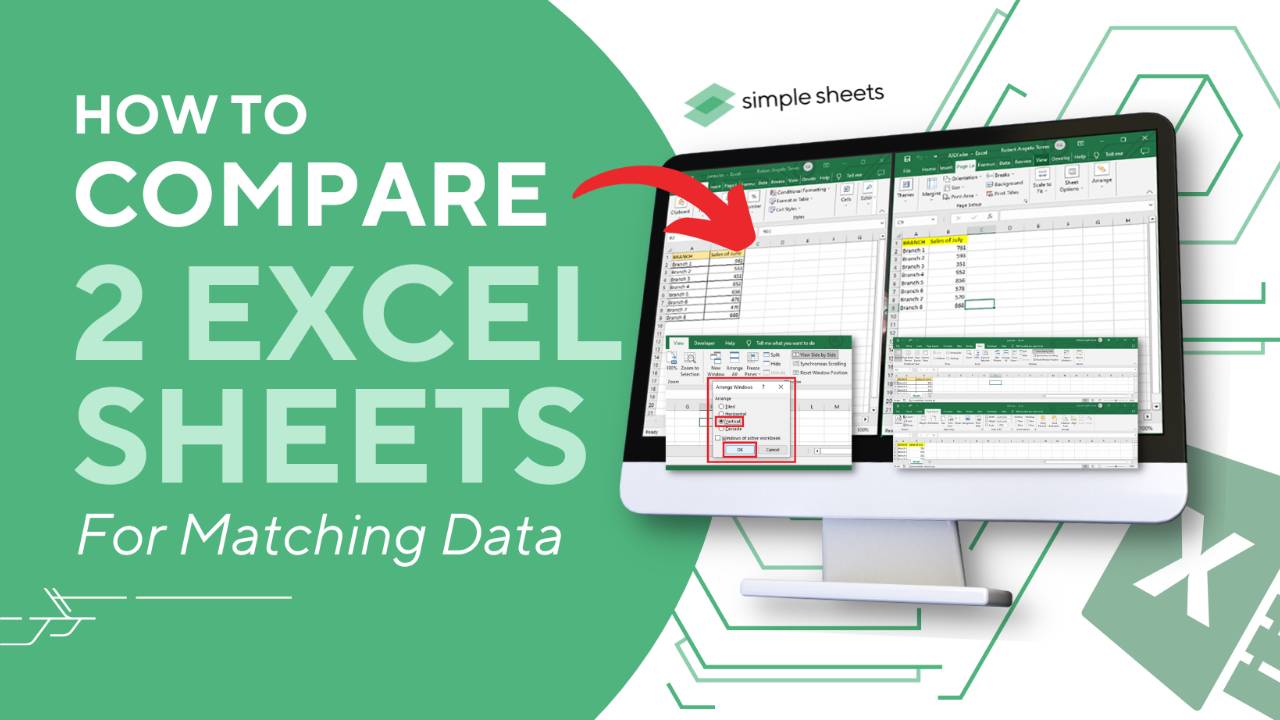Compare Data in Two Excel Sheets: Simplified Guide

Comparing data across two Excel sheets can seem daunting for many, especially when dealing with large datasets. Whether you're tracking changes in monthly sales figures, comparing year-over-year data, or just trying to spot discrepancies in inventory, Excel offers a variety of tools and methods to make this task easier. This guide aims to demystify the process, making data comparison in Excel straightforward and less time-consuming.
Understanding Excel's Data Comparison Capabilities

Before diving into the specifics, it's crucial to understand what Excel can do when it comes to comparing data:
- Data Visualization: Excel allows users to visually compare data through charts, conditional formatting, and pivot tables.
- Data Analysis Functions: With functions like VLOOKUP, INDEX/MATCH, and newer ones like XLOOKUP, you can automate much of the comparison process.
- Automation and Macros: For repetitive tasks, VBA scripting can automate data comparison.
- Filtering and Sorting: These features help isolate and focus on specific data points or discrepancies.
Let's explore how to leverage these capabilities step by step:
Step-by-Step Guide to Comparing Two Excel Sheets

1. Open Both Sheets

Start by opening both Excel files or sheets that you want to compare. If they are in the same workbook, ensure both tabs are visible.
2. Identify Key Columns for Comparison

Decide which columns are critical for your comparison. Common ones might include:
- ID numbers or names for unique identification
- Date columns for time-based comparisons
- Key metric columns for numerical comparisons
3. Use Conditional Formatting

Conditional formatting can visually highlight differences:
- Select the range of cells in one sheet you want to compare.
- Go to Home > Conditional Formatting > Highlight Cells Rules > Duplicate Values.
- Customize the formatting to highlight only unique values in each sheet.
🔍 Note: Use colors that are easy on the eyes for spotting differences.
4. Utilize Excel Functions for Automatic Comparison

Excel’s functions are powerful for automatic comparison:
- VLOOKUP: Ideal for comparing lists with unique identifiers.
- INDEX/MATCH: More versatile than VLOOKUP, especially for dynamic comparisons.
- XLOOKUP: Newer and more intuitive for users familiar with VLOOKUP.
Here's an example of how to use VLOOKUP:
| Formula | Explanation |
|---|---|
=VLOOKUP(A2, Sheet2!A2:B10, 2, FALSE) |
Looks for the value in A2 from Sheet1 in Sheet2's range A2:B10. If found, it returns the corresponding value from the second column (2). |

5. Use Excel’s Built-In Tools

Excel offers tools like:
- Pivot Tables: Create side-by-side comparisons or stacked data views.
- Inquire Tool: Compare entire workbooks with a click if you have the add-in installed.
6. Check for Structural Differences

Ensure both sheets have the same structure:
- Column headers should match.
- Check for merged cells or hidden rows/columns.
- Ensure data types are consistent across sheets.
7. Automation with Macros

For frequent comparisons:
- Record a macro while manually comparing data to automate the process for future use.
- Learn VBA to write custom comparison macros for more complex scenarios.
🖥️ Note: Macros can save time but require initial setup and potentially further updates as data structure changes.
Summing Up the Simplification

Comparing data between two Excel sheets doesn’t have to be an overwhelming task. By utilizing Excel’s robust set of tools, you can streamline the process, save time, and ensure accuracy. Remember to:
- Use conditional formatting for visual cues.
- Leverage functions like VLOOKUP, INDEX/MATCH, and XLOOKUP for automatic data comparison.
- Harness built-in tools like pivot tables and the Inquire add-in for larger datasets.
- Consider VBA for automation if you perform the same comparisons regularly.
By following these steps, even those who aren't Excel wizards can compare data with confidence and efficiency, leading to more informed decisions based on accurate data analysis.
What if the columns I want to compare are in different positions?

+
Use the INDEX/MATCH or XLOOKUP functions, which are more flexible and can handle different column positions. They require you to specify the column index to look up, which isn’t affected by the column’s actual position in the sheet.
Can Excel compare data in real-time from two sheets?

+
Excel doesn’t support real-time comparison across sheets. However, you can use VBA to automate comparisons at specified intervals or set up formulas that update as data changes.
How do I handle blank cells in my comparison?

+
Blank cells can be treated as zero, text, or ignored, depending on your formula or conditional formatting settings. For instance, you can modify VLOOKUP or XLOOKUP to include blank cells by setting the not_exact_match argument to TRUE for VLOOKUP, or by using IF statements to check for blank cells.



